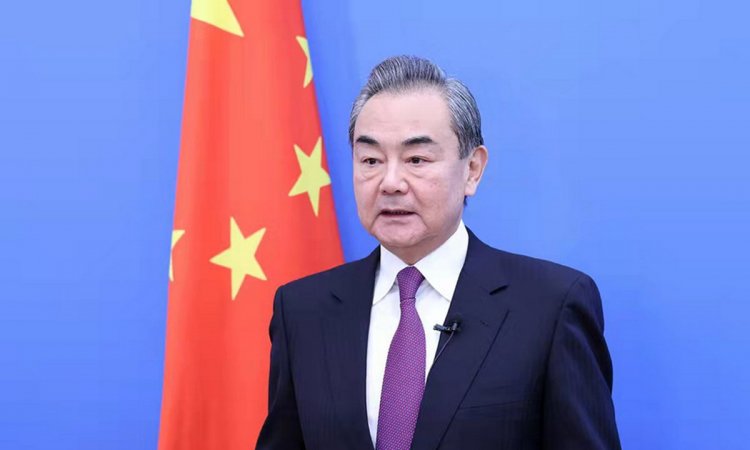India - China: ‘Setbacks’ in India-China Relations do not serve the Interests of both Countries - Wang Yi
Asia News Agency

In an environment of conflict around the Russia, China conflict, Chinese Foreign Minister Wang Yi said Monday that recent “setbacks” in India-China ties do not serve the interests of both countries, calling on ties “to move forward on the right track”.
Speaking to reporters at his annual press conference on the sidelines of the on–going session of the National People’s Congress or Parliament in Beijing, Wang said both sides should not let boundary issues ‘interfere’ with the rest of the relationship. “The boundary question is left over from history,” he said. “China has long advocated managing differences through equal–footed consultations, actively seeking a fair and equitable settlement while not letting it affect or interfere with the bigger picture of bilateral cooperation. I am talking about issues relating to the boundary and territory. I think people should understand this.”
Wang acknowledged that “relations encountered setbacks in recent years, which do not serve the fundamental interest of the two countries and people” and called for “relations to move forward on the right track to bring more benefits to our peoples and make greater contribution to the region and the world”.
“When our two countries achieve stability and prosperity and live in peace and harmony, global peace and prosperity will have a solid foundation,” he said. “As an Indian proverb goes, help your brother’s boat across and your own will reach the shore. We hope India will work with China to uphold the strategic consensus that the two countries pose no threat to each other and offer development opportunities to each other, continue to build mutual trust, avoid misunderstanding and miscalculation so that we will be partners for mutual success rather than adversaries for mutual attrition.”
China, may play with the US along with Russia
The above statement by the Chinese Foreign Minister is important. The Russia, Ukraine conflict could also trigger other crucial alignments.
In the view of former Foreign Secretary and Ambassador to China Vijay Gokhale could see China and the United States arrive at a new modus vivendi aimed at anchoring the world economy even as their tension-filled relationship continues and Beijing steams ahead toward its objective of establishing a solid presence in the Indian Ocean.
In an interview with The Indian Express, Gokhale said Beijing was not looking at the current conflict between Russia and the US in military terms, rather it was assessing Western capacity to wage a financial war and how to firewall its own economy if that same weapon was wielded against it. At the same time, it was also likely to be looking for more acceptability and partnership in a new world order that might begin to emerge over the next few months.
“The American and Western sanctions of Russia, the speed with which they were imposed, the spread of the sanctions, and also whether these are going to be actually applied, and what its impact is going to be on Russia, will serve as an “aha” moment,” he said, and were likely “the central focus of all study in China today”.
China would also be concerned about Russian President Vladimir Putin’s political future, Gokhale said. “I would think its concern, in the short to medium term, is the stability of the Russian government, because Putin’s continuance in office is critical to China’s security. If, for whatever reason, there is a change in government, any government that comes to power in Russia will be less accommodating…China will be less secure than it feels today” he said.
With this on its mind, said Gokhale, Beijing may craft a policy that would allow it to play a role in the resolution of the crisis to enhance its own acceptability to the world.
Chinese declining economy could be a threat to India
Amit Bhandari (senior fellow for energy, investment and connectivity studies, Gateway House), brings in another factor that could have a a bearing on future India, China relations.
The Chinese economy, he writes is in a decline, not terminal though. “Chinese economic statistics are unreliable. But now, those, along with other indicators, paint an unflattering picture of the economy, writes Amit Bhandari (senior fellow for energy, investment and connectivity studies, Gateway House). And the “gradual greying of China could reduce its economic potential."
Sectors in decline: The real estate sector that accounts for an estimated 25% of GDP is in turmoil. “China’s access to overseas capital is also declining. The crackdown on Alibaba and other tech majors is making foreign investors rethink…..
External footprint is also declining: “China’s external footprint is also declining. Sri Lanka and Pakistan, both part of the Belt and Road project, are facing an economic crisis, largely due to Chinese overreach and domestic mismanagement. Pakistan has approached the International Monetary Fund for a bailout, while Sri Lanka has drastically reduced the import of fertilisers and automobiles, and is paying for oil imports with tea. The money tap from China appears to have shut.”
With the economy much weaker than what Beijing would like to project, Bhandari argues “the risks for India and other countries that share land or a maritime boundary with China have increased. The Chinese Communist Party makes a big deal about the century of humiliation and how it has made China strong against foreigners. A dispute with a smaller neighbour can be an excellent way to drive home the message. If China perceives that it can no longer expect to overtake the United States, it will become more belligerent in the short-term, especially on its ever-increasing list of ‘core interests’. The ongoing crisis in Ukraine and the West’s ineffective response so far may embolden China further.”
Even though this analysis is based on limited information, Bhandari writes “India must be prepared. Even a declining China has significant economic and military advantages over India, and will be a formidable threat.”
















